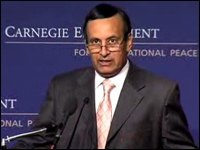Registration
You will receive an email confirming your registration.
The process of political evolution towards democracy needs to be supported regardless of the leaders it produces, asserted Pakistan’s Ambassador to the United States, Husain Haqqani. Haqqani joined Ashley J. Tellis in discussing Tellis’ new policy brief, Engaging Pakistan–Getting the Balance Right, in which Tellis warns that the next U.S. president must pursue a balanced strategy toward Pakistan that simultaneously strengthens the civilian government—the best hope for Pakistan’s long-term stability—without alienating the Pakistani army.
Tellis said that often the focus on Pakistan in U.S. policy circles has been instrumental, concentrated on how it can help win the “War on Terror.” The structural feature which characterizes Pakistan’s problematic polity—imbalances in civil-military relations—is often overlooked. He argued that three principles need to guide future U.S. policy towards Pakistan:
- The long term success of Pakistan depends on the support of responsible and responsive institutions in the country and this is as important for its own sake as for U.S. objectives.
- The rebalancing of civil-military relations requires U.S. engagement with both arms of the Pakistani state to create virtuous interactions between them.
- U.S. policy towards Pakistan cannot be limited to the elites and the state to the neglect of its society and people.
Tellis warned that if the United States does not exhibit patience and engage with both the civilian government and the military simultaneously, it could end up strengthening the ‘national security state’ which would result in long term failure of its policies in Pakistan.
Origins of Pakistan’s relationship with the U.S.
Commenting on Tellis’ propositions, Haqqani said that understanding Pakistan’s history is essential for evaluating its foreign policy today. Pakistan inherited 33 percent of undivided India’s military assets but only 17 percent of its revenues. This presented its early leadership with a choice —either Pakistan had to reduce its military assets or look for a patron to finance it. The perception of India as a hostile neighbor left the second alternative as the only viable one. This was the starting point for a close relationship with the United States which was initially cemented by opposition to the Soviet Union, but was driven mainly by a desire to gain security against India.
Support the democratic process and its outcomes
Haqqani argued that for the first time in a long history, there is genuine convergence of interests between the United States and Pakistan. Yet, there is a distinction of priorities between them. Pakistan is focusing on local terrorism while the U.S. scope is global—a difference often lost to U.S. policymakers who insist that “all politics are local” but fail to extend this mantra to foreign policy. Underscoring the need to move beyond the prism of U.S. interests in assessing Pakistan, Haqqani echoed Tellis when he said that the process of democracy needs to be supported by the U.S. regardless of the leadership it produces. He stressed that the new crop of leaders are the Pakistani people’s choice, which needs to be respected.
A balanced U.S. policy is necessary
According to Haqqani, the two factors critical to a stable Pakistan, which are in U.S. interests, are:
1) The rebalancing of civil-military relations; and
2) the rebalancing of professionals as compared to ideologues in the army.
He said that the international community should not reverse the directions of either by pressing the army for immediate change if conditions worsen under the civilian government in Pakistan. He also cautioned that this did not imply a swing to the other extreme, where the army is marginalized and all U.S. assistance is directed to the government, as suggested by many on Capitol Hill. This, he argued would only lead to failure of both short and long term objectives.
On a different note, he suggested that careful analysis of the country’s day to day affairs was also necessary. A complex and ethnically diverse nation, Pakistan’s government and mainstream is dominated by Punjabis and he warned against the danger of accepting mainstream viewpoints at face value, a danger crystallized in the Western media’s predictions of a hung parliament in the recently held elections (People’s Party of Pakistan eventually received a majority mandate). He further pointed out the Western media’s tendency to regularly suggest that Pakistan is on the verge of failure. He also said that there is a need to move beyond simple caricatures of Pakistani leadership and its weaknesses to an understanding of its resilience and support of the process.
Washington’s solutions may not always be effective
Haqqani also made the case against the usage of the phrase “War on Terror,” arguing that it gave a false sense of a war which could end with visible indicators like surrender or signing of armistices being witnessed. In Pakistan, he said, a military, ideological, and sociological struggle has to be undertaken to defeat terrorism. Haqqani contended that solutions sometimes advocated by Washington, like bombing of villages, were often not effective. In contrast, the civilian government’s policy of “engagement” with local chiefs, criticized by many in the United States, has helped to identify reconcilable and irreconcilable elements in the populations of FATA. This in turn gives legitimacy to the counterinsurgency—he also said that this was the reason unilateral strikes by the United States and the presence of its troops on Pakistani soil are opposed. Finally, he also said there was a need to understand the terrorism issue was multi-faceted. Pakistan’s relationships with Afghanistan and India are also factors and there was a need for the U.S. to appreciate those concerns.
In the question and answer session, Haqqani touched upon the Biden-Lugar bill, prospects for foreign investment in Pakistan, recent developments in the India-Pakistan relationship, the expected election of Zardari as president and the judiciary issue. Do sample the podcast for his comments on those issues.
